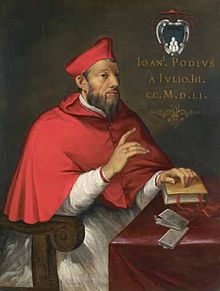Giovanni Poggi
|
His Eminence, the Most Rev. Lord Giovanni Poggi |
|
|---|---|
| Bishop emeritus of Tropea | |

A portrait of Poggio in 1551, shortly after his appointment as cardinal
|
|
| Province | Reggio |
| Diocese | Tropea |
| Appointed | 4 October 1541 |
| Term ended | 6 February 1556 |
| Predecessor | Girolamo Ghinucci |
| Successor | Gian Matteo di Luchi |
| Other posts | Apostolic Nuncio to Spain (1529–1541); Cardinal Priest of Sant'Anastasia (1552–1556) |
| Orders | |
| Consecration | 1541 |
| Created Cardinal | 23 March 1552 |
| Rank | Cardinal Priest |
| Personal details | |
| Born |
26 January 1493 Commune of Bologna |
| Died | 12 February 1556 (aged 63) Commune of Bologna |
| Nationality | Bolognese |
| Denomination | Roman Catholic |
| Residence | Commune of Bologna |
| Spouse | name unknown (died 1528) |
| Children | names unknown |
Giovanni Poggio (also written Poggi) (26 January 1493 – 12 February 1556) was an Italian Roman Catholic bishop and cardinal. He is mainly known for the elaborate decorations he arranged for his residence, the Palazzo Poggi.
Poggio was born in Bologna on 26 January 1493, the son of Cristoforo Poggio and Francesca Mantuana. He was married and had several children, becoming a cleric in minor orders only after his wife's death in 1528.
Pope Paul III appointed Poggio as a protonotary apostolic and treasurer of the Apostolic Camera.
From July 1529 to January 1535, Poggio was the nuncio to the Royal Court of Spain. From January 1535 to July 1537, he served as nuncio, residing in Madrid (with Giovanni Guidiccione serving as nuncio at the royal court). He was nuncio to the royal court again from July 1537 to March 1541.
Poggio was appointed Bishop of Tropea on 4 October 1541. He appointed a Vicar General to administer the diocese, since he was again nuncio to Spain from September 1541 to December 1551. From the 1540s until 1551 Poggi was papal nuncio at the Spanish court of the Charles V, Holy Roman Emperor.
In 1554, Pope Julius III dispatched him to attempt to convince Francis Borgia, a ranking Spanish nobleman who had recently renounced his position to enter the Society of Jesus, to accept a cardinal's hat, but Borgia refused.
...
Wikipedia
